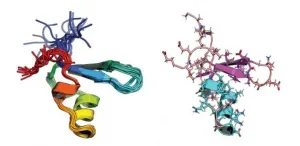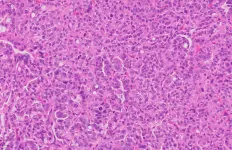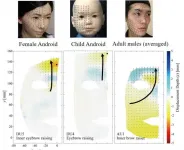Atomic techniques reveal the evolution of a bacterial protein
2021-03-22
(Press-News.org) A combination of an array of atomic-level techniques has allowed researchers to show how changes in an environment-sensing protein enable bacteria to survive in different habitats, from the human gut to deep-sea hydrothermal vents.
"The study gives us unprecedented atomic-level insight into how bacteria adapt to changing conditions," says Stefan Arold, professor of bioscience at KAUST. "To obtain these insights, we pushed the limits of three different methods of investigation and combined their results into a unified picture."
The histone-like nucleoid-structuring (H-NS) protein allows bacteria to sense changes in their environment, such as changes in temperature and salinity. Previously, the team had shown how the intestinal pathogen Salmonella typhimurium uses H-NS to control its gene expression profile, enabling it to live optimally inside its warm-blooded host or outside in the soil.
The H-NS protein is also found in bacteria that do not experience massive temperature fluctuations, such as plant pathogens, insect symbionts and free-living microbes that inhabit deep-sea hydrothermal vents. Still puzzling, however, is how different bacteria have adapted the same sensing mechanism to suit a variety of lifestyles.
No single analysis technique has been able to unravel the inner workings of this mechanism and so, to gain a more integrated view, Arold assembled a diverse team from KAUST and international collaborators. Arold and Lukasz Jaremko, a molecular biochemist at KAUST, collaborated with Jianing Li from the University of Vermont to combine several methods: protonless nuclear magnetic resonance spectroscopy, all-atom molecular dynamics simulations and biophysics techniques. This synergistic approach allowed the researchers to analyze the reaction of different H-NS proteins to temperature and salinity on an atomistic level.
All H-NS proteins displayed the same ancestral sensing mechanism, whereby temperature and salinity promoted melting of one of the two dimerization domains of H-NS, releasing its grip on DNA.
However, site-specific amino acid substitutions, mostly in residues involved in salt bridges, produced a range of static and dynamic features. These effects dampen or amplify the protein's response to suit the bacteria's lifestyle.
"Although the sequences of these proteins are largely conserved, small targeted changes lead to big differences in how they behave," says KAUST research scientist Umar Farook Shahul Hameed.
Thus, the H-NS protein of the apple pathogen Erwinia amylovora lost its sensitivity to heat, which is consistent with the pathogen's lifestyle in stable temperate climates. And only a few amino-acid changes made H-NS from Buchnera aphidicola almost environment insensitive, in line with its role as an obligate endosymbiont of aphids.
"If you tickle the right positions, the behavior changes very easily," says Arold. "Approaches interfering with this sensing mechanism might find applications in areas ranging from climate change mitigation to tackling antibiotic resistance".
INFORMATION:
[Attachments] See images for this press release:

ELSE PRESS RELEASES FROM THIS DATE:
2021-03-22
People are not very nice to machines. The disdain goes beyond the slot machine that emptied your wallet, a dispenser that failed to deliver a Coke or a navigation system that took you on an unwanted detour.
Yet USC researchers report that people affected by COVID-19 are showing more goodwill -- to humans and to human-like autonomous machines.
"The new discovery here is that when people are distracted by something distressing, they treat machines socially like they would treat other people. We found greater faith in technology due to the pandemic and a closing of the gap between humans and machines," said Jonathan Gratch, senior author of the study and director for virtual humans research at the USC Institute for Creative Technologies.
The findings, which appeared recently ...
2021-03-22
Cancer immunotherapy may get a boost from an unexpected direction: bacteria residing within tumor cells. In a new study published in Nature, researchers at the Weizmann Institute of Science and their collaborators have discovered that the immune system "sees" these bacteria and shown they can be harnessed to provoke an immune reaction against the tumor. The study may also help clarify the connection between immunotherapy and the gut microbiome, explaining the findings of previous research that the microbiome affects the success of immunotherapy.
Immunotherapy treatments of the past decade or so have dramatically improved recovery rates from certain ...
2021-03-22
National work-family policies that give lower-income families more time together while allowing them paid time off are more effective for children's psychological health than cash transfers, according to a study of developed nations led by Baylor University.
In a study of about 200,000 children in 20 developed nations, the United States ranked lowest in overall policies aimed at helping parents support children.
The study, published in the journal Social Forces, supports the view of critics who say that the United States government does not do enough to mandate ...
2021-03-22
Repeatedly getting angry, hitting, shaking or yelling at children is linked with smaller brain structures in adolescence, according to a new study published in Development and Psychology. It was conducted by Sabrina Suffren, PhD, at Université de Montréal and the CHU Sainte?Justine Research Centre in partnership with researchers from Stanford University.
The harsh parenting practices covered by the study are common and even considered socially acceptable by most people in Canada and around the world.
"The implications go beyond changes in the brain. I think what's ...
2021-03-22
Cancers are not only made of tumor cells. In fact, as they grow, they develop an entire cellular ecosystem within and around them. This "tumor microenvironment" is made up of multiple cell types, including cells of the immune system, like T lymphocytes and neutrophils.
The tumor microenvironment has predictably drawn a lot of interest from cancer researchers, who are constantly searching for potential therapeutic targets. When it comes to the immune cells, most research focuses on T lymphocytes, which have become primary targets of cancer immunotherapy ...
2021-03-22
Wikipedia page views could be used to monitor global awareness of biodiversity, proposes a research team from UCL, ZSL, and the RSPB.
Using their new metric, the research team found that awareness of biodiversity is marginally increasing, but the rate of change varies greatly between different groups of animals, as they report in a paper included in an upcoming special section of Conversation Biology.
Lead author, PhD student Joe Millard (UCL Centre for Biodiversity & Environment Research, UCL Biosciences and Institute of Zoology, ZSL) said: "As extinctions and biodiversity losses ramp up worldwide, largely due to climate change and other human actions, it's vital that ...
2021-03-22
A study by the Dian Fossey Gorilla Fund shows that gorilla families come together to support young gorillas that lose their mothers.
The findings, published in the journal eLife, use the Fossey Fund's more than 50-year dataset to discover how maternal loss influences young gorillas' social relationships, survival and future reproduction. The study shows when young mountain gorillas lose their mothers, the rest of the group helps buffer the loss by strengthening their relationships with the orphans.
"Mothers are incredibly important for survival early in life--this is something that is shared across all mammals," said lead author Dr. Robin Morrison. "But in social mammals, like ourselves, mothers often continue to provide vital support up to adulthood and even beyond."
"In ...
2021-03-22
Osaka, Japan - Researchers from the Graduate School of Engineering and Symbiotic Intelligent Systems Research Center at Osaka University used motion capture cameras to compare the expressions of android and human faces. They found that the mechanical facial movements of the robots, especially in the upper regions, did not fully reproduce the curved flow lines seen in the faces of actual people. This research may lead to more lifelike and expressive artificial faces.
The field of robotics has advanced a great deal over the past decades. However, while current androids can appear very humanlike at first, their active facial expressions may still be unnatural and slightly unsettling to us. The exact reasons ...
2021-03-22
Although cancers that occur in the gallbladder or bile ducts are rare, their rates are increasing. A recent study provides details on the burden of gallbladder and biliary tract cancer (GBTC) across 195 countries and territories from 1990 to 2017. The findings are published early online in CANCER, a peer-reviewed journal of the American Cancer Society.
Determining GBTC estimates and trends in different global regions can help to guide research priorities and policies for prevention and treatment. With this in mind, a team of scientists examined publicly available information ...
2021-03-22
Patient care by a single primary care physician is associated with many health benefits, including increased treatment adherence and decreased hospital admissions and mortality risk. But can the relationship built between doctor and patient also lead to unnecessary care?
A new University of Florida study finds that male patients who have a single general physician were more likely to receive a prostate cancer screening test during a period when the test was not recommended by the US Preventive Services Task Force. The study, which appears in END ...
LAST 30 PRESS RELEASES:
[Press-News.org] Atomic techniques reveal the evolution of a bacterial protein



